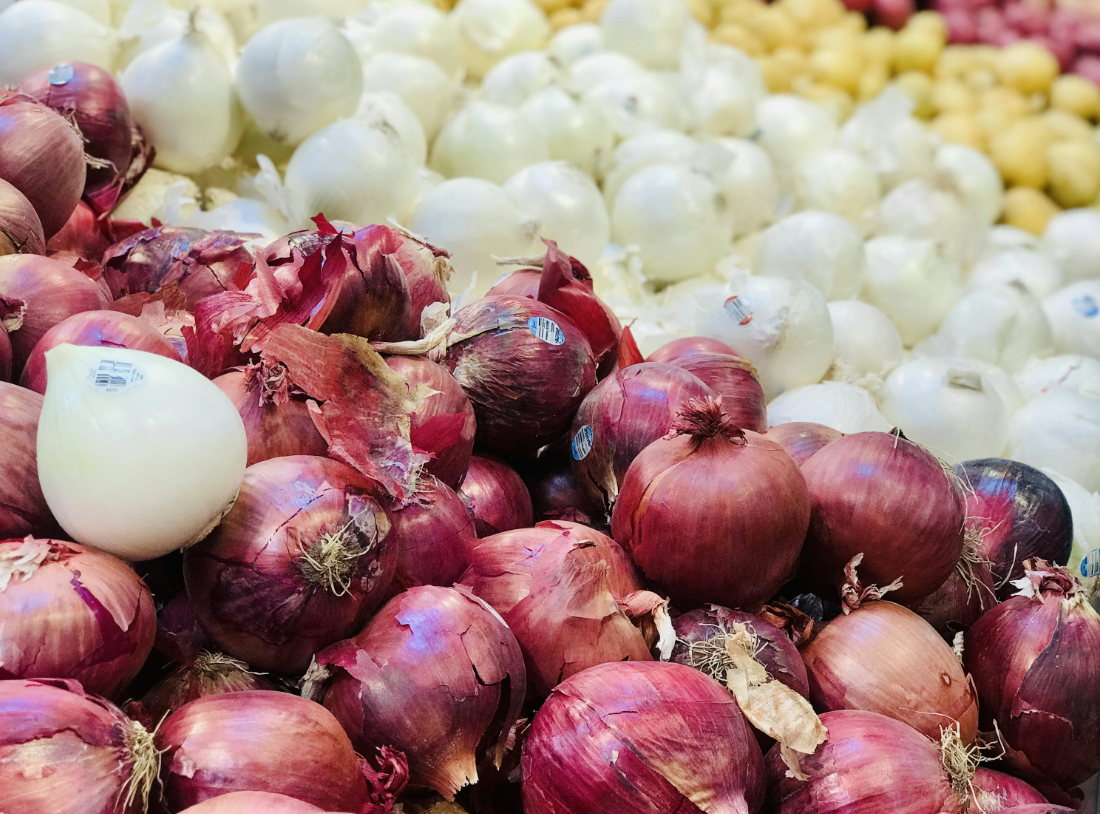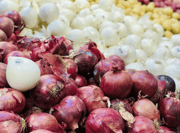
When you're standing in the produce aisle debating between red and white onions, you might think you're just choosing based on flavor or what looks good in your recipe.
Both red and white onions pack impressive health benefits, but they each have their own superpowers. Understanding the differences can help you make choices that support your health goals, whether that's protecting your heart, strengthening your bones, or simply adding more flavor to your meals without extra calories or sodium.
The nutritional showdown: how red and white onions compare
Despite their different appearances, red and white onions are remarkably similar nutritionally. Red onions contain about 44 calories per sliced cup, while white onions have 36 calories per 2/3 cup chopped. Both provide about 1 gram of protein, zero fat, and a modest amount of fiber and carbohydrates.
But here's where it gets interesting: the real differences lie in their antioxidant profiles. Red onions are especially high in quercetin, while white onions contain the least amount of quercetin and other antioxidants. This doesn't make white onions worthless—they still offer plenty of benefits—but it does give red onions a slight edge in the antioxidant department.
Red onions: the bone health champions
Red onions get their deep purple color from anthocyanins, the same antioxidants found in blueberries and red wine. These compounds, along with high levels of quercetin, make red onions particularly powerful for several health concerns that matter as you age.
The bone health research is especially compelling. A 2016 study found that healthy people in middle age and postmenopause who drank 3 ounces of onion juice every day for eight weeks had less bone loss and stronger bones. While onion juice might not sound appetizing, simply eating more onions in your regular meals appears to offer similar benefits.
Heart health benefits of red onions
Red onions support cardiovascular health through multiple mechanisms. Research shows the quercetin and anthocyanins help reduce inflammation, protect against cell damage, and may help lower blood pressure and cholesterol levels. They're also a good source of potassium, which plays a key role in heart health.
Beyond bones, red onions show promise for heart health. Research found that consuming 100 ml of onion juice daily for 8 weeks reduced total cholesterol by 10.2%, LDL cholesterol by 7%, and the LDL/HDL ratio by 6.8%. The quercetin in red onions also has antibacterial properties, and may inhibit the growth of several strains of bacteria, including Helicobacter pylori, which is associated with stomach ulcers and certain digestive cancers.
Also read: Experts reveal the protein-packed food that supports heart health after 60
White onions: the gentle giants
Don't let their milder color fool you—white onions bring their own set of impressive benefits. They're rich in vitamin C, folate, and fiber, and they support heart function with antibacterial properties that boost immune function.
The biggest advantage of white onions? They're typically easier on your digestive system. If you deal with irritable bowel syndrome, acid reflux, or other gastrointestinal sensitivities, white onions are often better tolerated than their red counterparts. They contain the same beneficial compounds as red onions, just in smaller amounts.
The brain and cancer protection connection
Here's something that might motivate you to add more onions to your grocery list: a study published in April 2020 in the American Journal of Clinical Nutrition found that a diet rich in flavonoids—commonly found in onions—can reduce the risk of developing Alzheimer's Disease and related dementias.
The cancer research is equally impressive. Researchers studied 833 participants and concluded that the odds of having colorectal cancer were 79% lower in people that ate higher quantities of allium vegetables than those with lower levels of consumption. That's a significant reduction from something as simple as eating more onions, garlic, and related vegetables.
Also read: The ultimate guide to snacking smart: 18 dietitian-approved snacks for healthy cravings
Smart storage for maximum benefits
Here's a tip that might surprise you: storing onions for at least three months increases quercetin levels. This means those onions you've had in your pantry for a while might actually be more nutritious than the ones you just bought.
Store your onions in a cool, dry place with good air circulation. Avoid the refrigerator for whole onions—the humidity can make them soft and moldy. Once cut, however, wrap them in plastic and refrigerate, where they'll keep for up to a week.
Digestive considerations and solutions
Onions are a rich source of prebiotics and fiber, with gut bacteria breaking down the fiber and fermenting it, allowing onions to serve as a prebiotic or food source for the bacteria, which aids digestion. This is generally beneficial, but some people experience bloating or gas.
If you're sensitive to onions but want their benefits, try starting with smaller amounts or cooking them thoroughly. The cooking process breaks down some of the compounds that cause digestive distress. You can also try white onions first, as they tend to be gentler than red varieties.
Also read: Over 50? This is the fruit neurologists want you to eat more often
Cooking tips to maximize health benefits
To reduce tears while chopping, the National Onion Association recommends chilling an onion for 30 minutes then cutting off its top. Leave the root end intact while chopping, as it contains the highest concentration of tear-inducing compounds.
For maximum antioxidant benefit, try to include both raw and cooked onions in your diet. Raw onions provide the highest levels of beneficial compounds, while cooking makes them easier to digest and can enhance the absorption of certain nutrients.
Smart choices for onion lovers
- Red onions offer more antioxidants and stronger bone health benefits
- White onions are easier on sensitive stomachs but still nutritious
- Both varieties support heart health and may reduce cancer risk
- Store whole onions in a cool, dry place for maximum nutrition
- Include both raw and cooked onions in your diet for optimal benefits
- Start with smaller amounts if you experience digestive sensitivity
Making room for both varieties
The truth is, you don't have to choose just one. Both red and white onions deserve a place in your kitchen and your diet. Use red onions when you want maximum antioxidant power and don't mind their stronger flavor—they're excellent in salads, sandwiches, and dishes where their color adds visual appeal. Turn to white onions for cooking applications where you want their beneficial effects without overwhelming other flavors, or when your stomach needs a gentler approach.
The average American eats about 20 pounds of onions per year, so you're likely already getting some benefits. But being intentional about including both varieties could amplify those health effects, particularly for bone health, heart protection, and potentially even brain health as you age.
Read next:
- Cheap And Healthy Burrito Bowl That Anyone Can Make
- This summer’s superfood stars: Which ones are worth adding to your plate?
- Save your health from escalating microplastics danger with these affordable superfoods!
What's your favorite way to use onions in your cooking? Do you notice a difference in how red and white onions affect your digestion? Share your onion wisdom and favorite recipes in the comments below.






